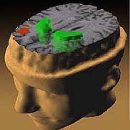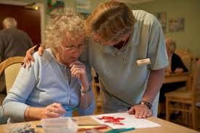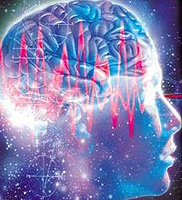What is post-stramatic syndrome? Symptoms of post-traumatic syndrome? Read the Answers in the article.
Content
Post Stravymatic syndrome
Man can adapt to various
circumstances; With the change of our life, we change and we ourselves.
What happens in us changes help survive, whatever conditions
We fell. However, some events, especially stretched
in time, able to cause a serious psyche disorder,
famous called «post-traumatic syndrome» (TCP).
Speaking
about post-traumatic syndrome, we mean that a person survived
one or more traumatic events that deeply affected him
psyche. These events differ so sharply from all over previous experience
Or caused so strong suffering that a person answered them
Stormy negative reaction. Normal psyche in such a situation
Naturally seeks to mitigate discomfort: a person who survived the like
reaction, radically changes its attitude towards the world around,
To live a little easier.
If the injury was
relatively small, then increased anxiety and other symptoms
The syndrome will gradually pass within a few hours, days or
weeks. If the injury was strong, or traumatic events
repeated repeatedly, painful reaction can be preserved
For many years.
Other side of post-traumatic syndrome
refers to the inner world of personality and is associated with the reaction of a person
on experienced events. We all react differently: tragic
The incident may cause severe injury to one and almost will not affect
psyche of another. It is also very important at what point the event occurs:
The same person at different times can react differently.
IN
same time a man strive to think, feel and act so,
To avoid heavy memories. Just as we purchase
Immunity to a certain illness, our psyche produces a special
Mechanism for protection against painful experiences. When this
does not happen and man fails for one reason or another
The way to discharge the internal tension, its body and psyche find
The way somehow apply to this tension. In this, in principle,
and consists of a mechanism of post-traumatic syndrome, the symptoms of which
In the complex look like a mental deflection, although in fact
are just a deeply rooted way of behavior related
with extreme events in the past.
With post-traumatic seroid, the following clinical symptoms are observed:
- Unmotivated vigilance. A person closely monitors everything that happens around, as if he is constantly threatened with danger.
- Explosive reaction.
With the slightest surprise, a person makes rapid movements
(rushes to the ground at the sound of a low flutter helicopter, sharply
turns and takes a combat pose when someone approaches it
From behind the back).
 Nudeness emotions.
Nudeness emotions.
It happens that a person completely or partially lost the ability
to emotional manifestations. It is difficult for him to install
And friendly connections with others, joy is not available, love,
Creative rise, playfulness and spontaneity.
- Aggressiveness.
The desire to solve problems with rough strength. Although, as a rule,
This applies to physical power, sometimes meets
Mental, emotional and verbal aggressiveness. Simply say,
man is inclined to apply power pressure on others,
When wants to achieve his, even if the goal is not vital.
- Memory disorders and concentration. A person is experiencing difficulty when they need to focus or remember something.
- Depression.
In a state of post-traumatic syndrome, a person seems to be that all
meaningless and useless. This feeling is accompanied by nervous exhaustion,
apathy and negative attitude to life.
- Total anxiety.
Manifests itself at the physiological level (back lubrication, stomach spasms,
headaches), mental sphere (constant anxiety
and concern, «Paranoid» phenomena for example, unreasonable
fear of persecution), in emotional experiences (constant feeling
fear, uncertainty, fault complex).
- Attacks of furious. Such attacks occur more often under the influence of narcotic substances, especially alcohol, but they also happen.
- Template for abuse narcotic and drug substances.
- Unfinished memories.
Perhaps this is the most important symptom giving the right to speak
On the presence of syndrome. In memory of the patient suddenly pop up terrible,
Ugly scenes associated with a traumatic event. These memories
may occur both in a dream and during wakefulness. In reality
appear in cases where the surrounding situation reminds something
happening at the time.E. During the traumatic event: smell,
spectacle, sound, as if coming from that time. Bright images of the past
collapsed on the psyche and cause strong syndrome.
Disadvised
Memories coming in a dream are called nightmares. Dreams like
The genus is usually two types: first, with accuracy of video,
transmit a traumatic event as it imprinted in memory
His man who survived him; In the dreams of the second type of furnishings and characters
may be completely different, but at least some of the elements
(face, situation, feeling) are similar to those that took place
In a traumatic event. Man awakens from such sleep perfectly
broken; His muscles are intense, he is all in sweat. In medical literature
Night sweat is sometimes viewed as an independent symptom, on
the basis that many patients wake up wet by sweat,
But do not remember that they dreamed.
- Hallucinatory experiences.
This is a special kind of impaired memories of traumatic
events with the difference that with hallucinatory experience
What happened is so bright that the events of the current moment
as if we go to the background and seem less real than
memories. In that «hallucinatory», abandoned man
behaves as if he is going through the past traumatic
event; he acts, thinks and feels just like at that moment,
when he had to save his life.
Hallucinatory
Experiences are characteristic not to all patients: it is just a kind
unintelligible memories for which special brightness is characteristic
and soreness. They are more likely to be influenced by narcotic substances,
in particular alcohol, however, hallucinatory experiences can
appear in humans and in sober state, as well as the one who ever
does not use narcotic substances.
- Insomnia
(Difficulties with falling asleep and intermittent sleep). When a person is visited
nightmares if a person is afraid to fall asleep and see it again.
Regular lack of sleep leading to extreme nervous exhaustion,
complements the picture of post-traumatic syndrome. Insomnia also
It is caused by a high level of anxiety, inability
relax, as well as an impassive sense of physical or spiritual pain.
- Thoughts about suicide.
The patient constantly thinks about suicide or plans any
actions that ultimate should lead it to death.
- Wines survivor.
The feeling of guilt due to the fact that survived in heavy trials worthwhile
Others, often inherent in those who suffer from emotional deafness
(inability to survive joy, love, compassion and t.D.) since
traumatic events. Many sacrifices of syndrome are ready for anything,
if only to avoid reminder of the tragedy, about the death of comrades.
Painting
mental state and human behavior that was named
post-traumatic syndrome syndrome describes a certain way
existence in this world. Traditional approach - provision
Patients with post-traumatic syndrome opportunities to participate in different types of adaptation
programs - does not solve the problem, since the main focus of all
these programs lies not in the desire to help a person get rid of
from a psychological problem, and in an attempt to bring it changed
ideas about the surrounding reality to the standards adopted
In this society.
Unfortunately, many doctors forget the fact,
that true physical and mental health consists not to
comply with social standards and standards, and in order to come
By agreement with himself and the real facts of your life. If today
On the circumstances of life, great influence is rendered
Memories, behavior, image of thoughts and feelings
from the past, it is very important to honestly recognize their existence, even if
Someone will seem «abnormal».









